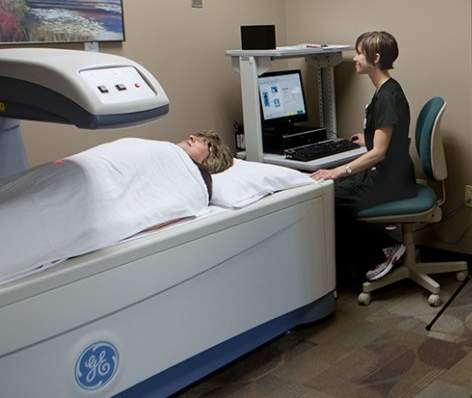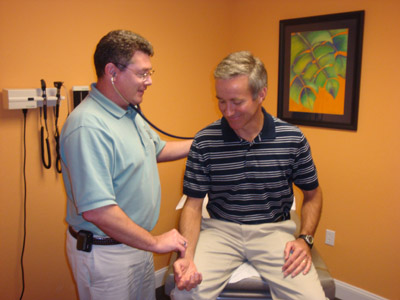
Preventive Medicine
 New patients are given an Executive Complete Physical. This is a comprehensive preventive visit that includes a 12 lead electrocardiogram, pulmonary function test, vision test, BMI determination, blood pressure, vitals, review of family & social history, an immunizations update and laboratory testing (which includes a complete blood count, complete chemistries, C- reactive protein, lipid panel, hemoccult testing, and UA). Other surveillance protocols for problem specific Internal medicine problems are used in our clinic to improve patient care and follow-up.
New patients are given an Executive Complete Physical. This is a comprehensive preventive visit that includes a 12 lead electrocardiogram, pulmonary function test, vision test, BMI determination, blood pressure, vitals, review of family & social history, an immunizations update and laboratory testing (which includes a complete blood count, complete chemistries, C- reactive protein, lipid panel, hemoccult testing, and UA). Other surveillance protocols for problem specific Internal medicine problems are used in our clinic to improve patient care and follow-up.
Recommended Preventative Services By Age in Brief:
MEN
| Age 25-39 | Preventative Labs for age every 3-5 years | |
| Age 40-49 | Preventative labs for age yearly, Rectal examination yearly, PSA yearly until 70 | |
| Age 50-64+ | Colonoscopy screening, ABI, ECG | |
| Age 65+ | Special vaccines, Yearly flu vaccination |
WOMEN
| Age 18-39 | Yearly to every 2 year PAP smear, Preventative labs every 3-5 years | |
| Age 40-49 | PAP smear every 3 years, Mammograms yearly, Preventative labs yearly | |
| Age 50-64+ | Bone density exam, Colonoscopy screening | |
| Age 65+ | Special vaccines, Yearly flu vaccination |
Note: This is not a comprehensive listing of all of our recommendations
 The Power of Preventive Care
The Power of Preventive Care
Your healthcare team at Medpeds Associates of Sarasota is an important partner in caring for your health. Our main emphasis is on prevention. Preventing disease is less costly and more rewarding than correcting problems once they occur. Good health is no accident. It is the result of good habits, proper nutrition, and regular professional care. Through periodic exams, your physician can screen for and treat disease and disorders as soon as they are detected, increasing your chance for a full recovery. By helping you develop good habits and behaviors, you can lead a longer, healthier life. That’s what preventative care is all about.
Even when healthy, adults should visit a clinician periodically.
The purpose of these visits is to:
- screen for diseases
- assess risk of future medical problems
- encourage healthy lifestyles
- update vaccinations
- maintain a relationship with a doctor in the event of an illness
Health maintenance visits differ from visits needed by people who have medical problems that need to be monitored and treated.
Even if you feel fine, it is still important to see your healthcare provider regularly to check for potential problems. Most people
who have high blood pressure don’t even know it. The only way to find out if you have hypertension is to have your blood pressure checked regularly. Likewise, high blood sugar and high cholesterol levels often do not produce any symptoms until advanced disease has occurred. The earlier a disease is found, the better the chances for successful treatment and possible cure.
